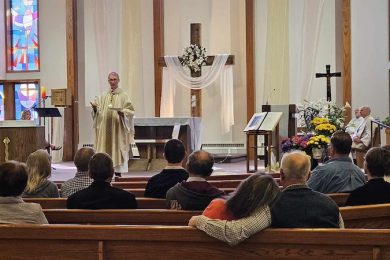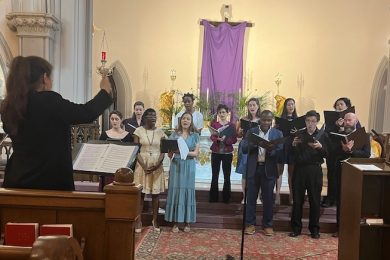Bailey Ziegler
Human resources director, Diocese of St. Cloud
 Bailey Ziegler feels her work as the human resources director for the Diocese of St. Cloud is so much more than policies and payroll. It’s a ministry.
Bailey Ziegler feels her work as the human resources director for the Diocese of St. Cloud is so much more than policies and payroll. It’s a ministry.
“God calls us to not only take care of ourselves, but to care for our neighbor,” she said. “The Gospel tells us to care for the least among us. In our society one way to do this that makes a real difference is to look at how people are treated in the workplace. This is where people earn their living to care for their families and their community.
“It is also the place we spend a lot of time developing into who God calls us to be,” she added. “If our sisters and brothers, no matter where they are working, all are entitled to be treated with dignity in their work, we cannot turn a blind eye to these issues of human dignity in our own companies and in our world.”
Ziegler has served in ministry for 15 years. Starting off in campus ministry leadership as a college student at New Mexico State University, she majored in business leadership and human resources management. She later received a master of divinity degree from St. John’s School of Theology and Seminary in Collegeville.
“It was there that I discovered I didn’t have to choose between following a calling to serve in ministry or my interest in leadership human resources,” she said.
It was also at St. John’s that she dived deeper into the relationship between work and prayer and how it relates to Catholic social teaching, particularly the theme of dignity of work.
“Dignity of work to me really means that all of us, no matter what we are doing in our jobs or in home lives, has worth and value. I was lucky to study and work surrounded by Benedictines for several years at St. John’s, and this is something that is a part of who they are. They see their work as prayer, and no job or task is better or more worthy than another,” she said.
Ziegler was also inspired by the writing of St. John Paul II’s encyclical “Laborem exercens” (“On Human Work”).
“During his time serving in a Nazi concentration camp, he saw what undignified work looked like and helped us as a Church further think about the meaning of work and dignity in the workplace. In my work and study, I have found that these concepts often are addressed about workers, but as a Church we can lose sight of the importance of these practices for ourselves.
“We can be the best advocates and lobbyists for just practices in the workplace, we can read hundreds of years of popes’ teachings on fair and living wages to workers, of how important work is to who we are as people, growing into the person God calls each of us to be. And, yet, we are the first to exempt ourselves from the laws we advocate for,” she said.
She feels that education is key in taking an active role in supporting the rights of workers, especially surrounding legislation that impacts pay equity, fair wages and leave laws.
“It can be easy to dismiss these, thinking that ‘Those won’t affect me,’ or ‘I didn’t have that when I was in the workforce.’ Oftentimes, in our politically polarized society, we see a headline that one party wants to pass a law and automatically dismiss it as bad or wrong if it doesn’t align with our political party.
“These issues are not so simply boiled down. Learning about the wide impacts and nuances of these is the way we can find common ground across party lines and advocate for the common good. After education, it’s about getting involved in helping to create systems that benefit all people.”
Deacon Todd Warren
Human resources relationship manager
 Deacon Todd Warren works in corporate HR for a regional community bank as an HR relationship manager, a role he has held for nearly 20 years. Ordained a permanent deacon in 1997, he currently serves at St. Michael Parish in St. Cloud and St. Joseph Parish in Waite Park.
Deacon Todd Warren works in corporate HR for a regional community bank as an HR relationship manager, a role he has held for nearly 20 years. Ordained a permanent deacon in 1997, he currently serves at St. Michael Parish in St. Cloud and St. Joseph Parish in Waite Park.
“While I have to walk that fine line between proselytizing at work, I don’t hide my faith and I don’t hide the fact that I am a Catholic and a permanent deacon. In fact, it has opened up many conversations where I have been approached to get my perspective on an aspect of our faith or on a moral dilemma that someone may be struggling with on a personal level,” he said.
And he relies on his faith, and the teachings of the Church, in all instances of decision-making.
“I want to ensure that I never impugn my personal integrity and I never want to bring scandal through my actions and in any aspect of my work. I approach all my interactions with a belief that everyone is owed the right to be treated with dignity and respect — regardless of the situation or the circumstances that I may be dealing with for a given employee relations issue.”
Deacon Warren also feels it is a basic tenet of human dignity to be able to work in a position that not only provides for basic economic needs but also allows people the ability to find fulfillment, the chance for growth and development and the opportunity to use their God-given skills and talents.
“As Catholics, it dovetails with our belief that all life is precious from birth until natural death, and that means that all humans are deserving of being treated with dignity and respect. We don’t check our rights to be treated well just because we have punched the clock at the workplace,” he said.
“As Catholics we should always be aware of and concerned about the working conditions of the employees who are providing the goods and services we consume. Are they treated well in their work environment? Are they paid a fair wage for a day’s work? Are they getting basic benefits that help to take care of the basic needs for them and their family? Does their employer recognize that the success and life they enjoy is only possible because of the people that work for them?”
Deacon Warren said everyone can take an active role in supporting the rights of workers through everyday interactions.
“I have witnessed a dramatic decline in civility and tact. I find it appalling when I watch someone unload on a clerk in a store or a server in a restaurant for either a simple error or because they felt they were not being attended to in a manner fitting of their expectations. Give employees a break — you don’t know what is going on in their life right now. Every employee has a story and every employee brings their life story with them to work every day.
“The other thing I would add is that if we are truly concerned about the rights of workers, it would behoove us to change our buying habits. Are you checking out the source of brand name products you are buying? Do you
know for sure products are not being made by child labor or in a sweatshop in a foreign country? Also, are you frequenting local businesses and buying products that are sourced either locally or, at the very least, made in a country that does not violate human rights on a regular basis?
“While I appreciate the convenience of next-day delivery of items as much as anyone, I think we have to make a conscious effort in our purchasing to support local businesses, or at least find suppliers of goods and services we are seeking, that are not going to continue to allow gigantic multinationals to reap obscene profits and to ultimately put our hometown businesses out of business.”
PegAnne and Byron Bjorklund
Owners, Custom Catering by Short Stop
 According to Byron Bjorklund, owner of Custom Catering by Short Stop in St. Cloud, you don’t have to start off with a Hail Mary and an Our Father to bring the Catholic faith into the workplace. You start by walking the walk.
According to Byron Bjorklund, owner of Custom Catering by Short Stop in St. Cloud, you don’t have to start off with a Hail Mary and an Our Father to bring the Catholic faith into the workplace. You start by walking the walk.
This philosophy is not something he developed overnight. It started as a child, growing up in a faith-filled family in Sauk Rapids. In 1974, when Bjorklund was just 11, he began working in his family’s restaurant, where he watched his mother treat everyone with respect and dignity.
“When you’re young and immature, you have your faith. But as you mature, you realize it is not separate from your life. You realize that you are meant to live your faith in action. At work, you can create the overall atmosphere in the workspace by the way you treat everyone. Not just your employees, but vendors, customers and then how you talk about those customers, vendors and employees when they are not present. You create the tone of what the environment is going to be,” he said.
Whether making chicken, catering a wedding or running around in 97-degree heat, Bjorklund said, “you’ve got to create an atmosphere that keeps the team moving in a good and respectful way because that can boil over real quick.”
“I have to keep my cool, keep a smile on my face and roll up my own sleeves. I’m sweating right along with my team. If I was sitting around complaining about how hot it is, I’m probably not going to get a lot of respect. It’s not that I have to be in there working with them. It’s that you have to lead by example. If they see how happy I am doing the work, it’s funny, but they are a lot happier, too.”
Bjorklund has a soft spot for hiring people with special needs and also tries to give jobs to people who are in need of second chances.
“You know what you get when you give people a chance to work and treat them with respect? When you show kindness and fairness to people, you get more loyalty. Now, you’ve got to make sure you have people in the right spot, but I also believe there’s a spot for everyone. Instead of saying that someone doesn’t fit our work culture, how about bringing people in and changing the culture?”
Bjorklund knows he isn’t perfect, and it’s taken him a long time to put into practice all that he has learned. And there are plenty of times his head hits the pillow at night and he wishes he had chosen different words or actions to handle a situation. But there are many more interactions that assure him Christ is alive and well in the workplace.
He recalls an encounter with a young woman who worked for him.
“She was going through kind of a tough time and I just gave her a few real short words of encouragement. Fast forward about five years later: I ran into her mother who told me those little things I had said changed her life. When you are the employer, your words carry weight. And that can be good or bad. As you internalize those experiences, I realize that I wanted be more mindful of people’s feelings and emotions and what they are going through in their lives. That’s how Christ can work in the workplace.”
Bjorklund also said that, as more young people are less involved in the Church, community interactions, including those in the workplace, are even more important in evangelization.
“Christ is not walking around talking to people on earth anymore, so those of us who are believers are Christ’s hands and feet now. Sharing his message and the building of the Church is on us. How does Christ work? He sends us each other. And if you think about who you are in contact with each day, that Christ sent you that person, once you have that awakening, your daily interactions change. You learn to be kind. You learn to see Christ in each other. And that is how Christ can work through us.”





















